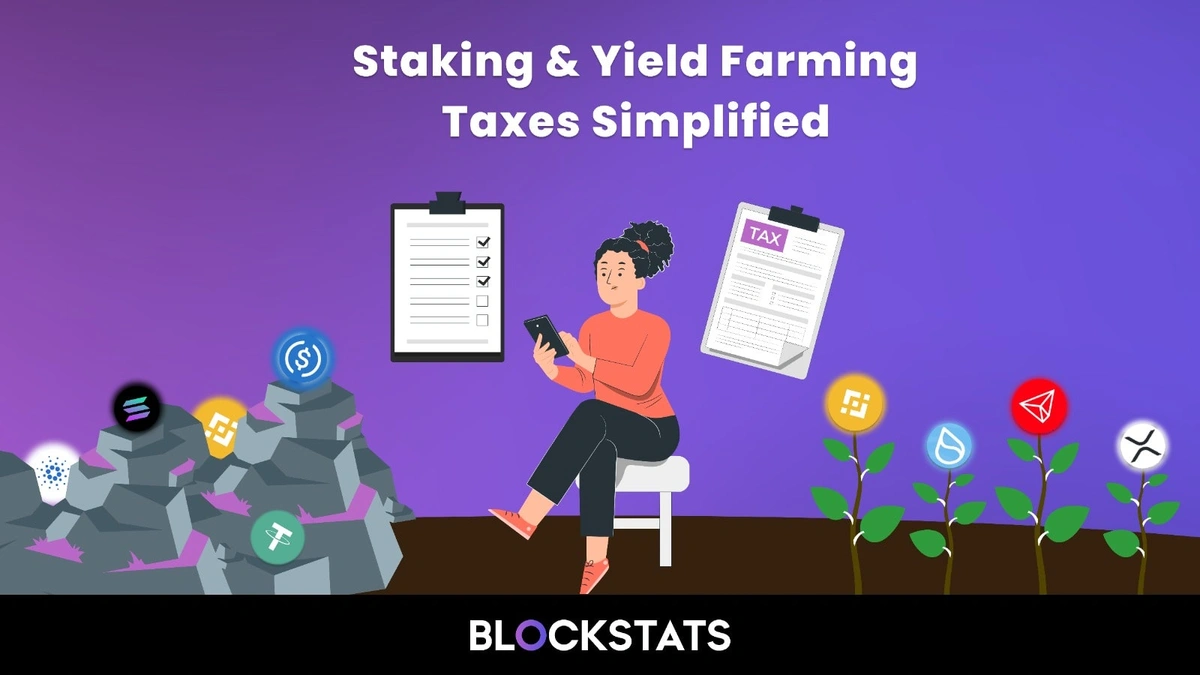How Blockstats Simplifies Staking & Yield Farming Tax Reporting?
As decentralized finance (DeFi) continues to revolutionize the way investors earn passive income, new tax challenges are emerging, particularly around staking and yield farming. These popular strategies generate income through token rewards, interest, and liquidity incentives, but each comes with complicated tax implications.
Whether you are a seasoned DeFi investor or just getting started, navigating the tax side of things can be overwhelming. Fortunately, platforms like Blockstats are stepping in to simplify the process.
From tax basics to hassle-free reporting, this guide covers everything about staking and yield farming and how Blockstats makes tax reporting effortless and accurate.
Understanding the Tax Implications of Staking & Yield Farming
Before diving into how Blockstats helps, it is essential to understand the basic tax rules associated with staking and yield farming:
Staking Income
When you stake tokens (e.g., ETH, ADA, SOL), you typically receive rewards. These rewards are considered taxable income at the time of receipt, based on their market value in your local fiat currency.
Yield Farming Rewards
In yield farming, investors lock crypto in DeFi liquidity pools to generate income from token rewards, transaction fees, or governance benefits. Like staking, these are generally taxable as ordinary income when received and may also trigger capital gains when the assets are eventually sold or swapped.
Other Complex Scenarios
-
Re-staking rewards can compound your tax obligations.
-
Swapping farmed tokens for other assets can result in capital gains/losses.
-
Claiming crypto airdrops from DeFi protocols may also be taxable events.
Tracking all this manually? Practically impossible.
How Blockstats Simplify Staking & Yield Farming Tax Reporting?
Blockstats is built specifically for crypto investors who need an automated, accurate, and transparent way to manage their tax obligations — especially in the complex world of DeFi. Here is how Blockstats makes it easy:
1. Real-Time Reward Tracking
Blockstats integrates directly with major blockchains and DeFi protocols to track staking and farming rewards as they are earned. This means:
-
No need for manual entry
-
Every transaction, reward, and claim is automatically logged
-
Market value is captured at the exact moment of receipt
This feature ensures you always have accurate income data for tax reporting — down to the cent.
2. Categorization of Income vs Capital Gains
DeFi activities often involve a mix of income (like staking rewards) and capital events (like swapping tokens). Blockstats automatically classifies each transaction based on tax logic, so you know:
-
What needs to be reported as income
-
What counts as a disposal (triggering capital gains or losses)
-
Which assets are still held vs already sold
This eliminates the guesswork and aligns your records with local tax rules.
3. Seamless Integration with Wallets and DeFi Protocols
Blockstats connects to:
-
On-chain wallets like MetaMask, Trust Wallet, and Ledger
-
Popular DeFi platforms like Uniswap, Aave, Compound, PancakeSwap, Curve, and more
-
Ethereum, Binance Smart Chain, Solana, and other major blockchains
With API and public wallet syncing, your staking and farming activities are captured in one place — no spreadsheets, no hassle.
4. Tax-Ready Reports in Clicks
Once all data is synced and classified, Blockstats generates tax-ready reports that can be:
-
Exported to your accountant
-
Integrated with platforms like Koinly or CoinTracker
-
Customized based on your local tax jurisdiction (e.g., IRS for the U.S., HMRC for the U.K., ATO for Australia)
Reports include details like:
-
Total staking income
-
Yield farming income
-
Short-term vs long-term capital gains
-
Transaction history and fair market values
Everything you need, neatly organized and compliant.
5. Multi-Year and Multi-Asset Support
Whether you have been yield farming for one year or five, Blockstats can pull historical data and compile multi-year reports, ensuring you are covered even if you have been behind on your crypto taxes.
It also supports a wide range of DeFi tokens, LP tokens, governance tokens, and synthetic assets, making it one of the most comprehensive crypto tax tools for DeFi users.
6. Privacy-First and Secure
Tax tools deal with sensitive financial data, and Blockstats takes that seriously. It offers:
-
Read-only access for wallets and exchange connections
-
No custody of funds
-
Encrypted storage of user data
-
Two-factor authentication (2FA) for account security
Your privacy and asset safety remain fully under your control.
Automate Your DeFi Tax Filing with Blockstats
Staking and yield farming offer exciting opportunities for passive income — but they also introduce complex tax obligations that many investors are not prepared for. Misreporting or underreporting crypto income can lead to audits, penalties, or worse.
With Blockstats, you don’t have to worry.
Its automated tracking, smart classification, real-time syncing, and compliant reporting features make it the go-to solution for DeFi investors who want to stay compliant without the headache.
If you are looking to simplify your crypto tax reporting, especially for staking and farming income, Blockstats is the smart, secure, and scalable choice.
